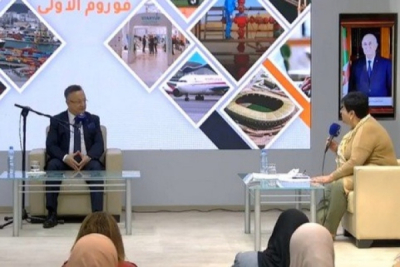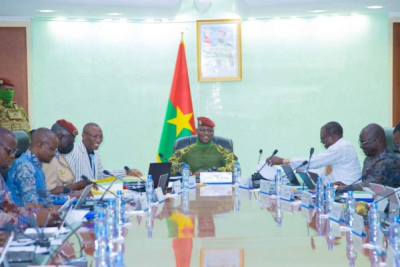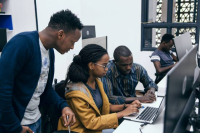
Tech (1152)
Africa remains the region of the world where health challenges are most critical. Thus, e-health represents an opportunity for the development of the sector, particularly due to the high mobile phone penetration rate on the continent and its widespread use.
On Thursday, April 18, the International Committee of Digital Health Experts in Africa (CEISNA) announced a partnership with the Higher Institute of Medical Techniques of Lubumbashi (ISTM) in the Democratic Republic of Congo. This agreement aims to promote digital health in Africa.
"This agreement marks a decisive step in the promotion of digital health in Africa, by uniting the efforts of CEISNA and the Higher Institute of Medical Techniques to improve healthcare access through cutting-edge technologies," CEISNA stated in a press release.
As part of this partnership, CEISNA will bring its international expertise in digital health to enhance the capabilities of the Higher Institute of Medical Techniques in the areas of training, research, and implementation of innovative health solutions.
This collaboration is part of CEISNA's efforts to promote e-health education in African universities. Earlier in April, the committee also announced a partnership with the Higher Institute of Public Health in Bamako aimed at improving health systems in Mali through digital technology.
These partnerships come at a time when African governments are increasingly looking to leverage innovative technologies in the healthcare sector. It is becoming urgent for Africa to massively develop systems incorporating artificial intelligence techniques to significantly improve care and provide effective responses to some difficult and rare diseases. According to a report by Fortune Business Insights, the global digital health market is expected to reach $559.52 billion by 2027.
Samira Njoya
The government aims to transform Cameroon into an emerging country by 2035. To accelerate the achievement of that goal, the executive is focused on developing information and communication technologies.
On Tuesday, April 16, in Yaoundé, the construction of the Digital Transformation Center of the Ministry of External Relations (CTDM-MINREX) was officially initiated by the Cameroonian Minister of External Relations, Lejeune Mbella Mbella. This center, slated to be fully operational within a year, is designed to digitize and secure consular data.
The CTDM will be housed in a four-story, eco-friendly building, outfitted with cutting-edge technologies. It will encompass an ICT laboratory, a management unit for the procurement, storage, and distribution of consular materials, a training room, a round-the-clock call center, and a data storage unit, among other facilities.
The establishment of this center is a key component of a wider modernization initiative undertaken by the Ministry of External Relations. This initiative encompasses the roll-out of a digital platform for managing consular services, the equipping and operationalizing of diplomatic and consular posts, and the enhancement of consular officers’ skills.
In executing these projects, Cameroon is backed by Impact Palmarès R&D SAS, an Ivorian firm specializing in biometric solutions. Headquartered in Abidjan, this company was a technical ally to Cameroon in the successful deployment of e-visas a year prior. As per MINREX, from April 30, 2023, to March 30, 2024, Cameroon welcomed 158,000 visitors.
Once operational, the CTDM-MINREX is expected to improve the quality of Cameroon’s consular services to meet international standards. The center will also streamline consular procedures and speed up the process, enabling applicants to receive their electronic visas within 24 to 48 hours.
Samira Njoya
Since its inception in 2022, the AfricaTech Awards have awarded a dozen startups for the tangible impact of their activities on society. For its third edition, the event organizers continue to pursue the same goal.
Viva Technology, or VivaTech, an annual exhibition dedicated to technological innovation, announced on Wednesday, April 17, the 45 African startups selected for the finals of the third edition of the AfricaTech Awards. This Pan-African initiative aims to identify and support impactful innovative startups across the continent. The event will take place on May 24 in Paris, alongside VivaTech.
The 45 finalists were chosen from 310 applications following an evaluation conducted by VivaTech and its knowledge partner, Deloitte. These startups hail from 37 African countries, with Kenya, Nigeria, and Egypt having the highest participation since 2022. The finalists are divided into three categories: e-commerce & FinTech (15), Climate Tech (15), and Health Tech (15).
Following a second evaluation by a panel of experts consisting of C-Level partners, investors, and CEOs of incubators, the top three startups from each category will have the opportunity to participate in the 2024 edition of Viva Technology, which will be held from May 22 to 25 in Paris.
According to VivaTech's press release, among the 45 selected startups, 42% are founded or co-founded by women, and nearly 90% have at least one woman on their board of directors. They were selected for the concrete impact of their activities on society or the environment, the creation of remarkable innovation, the scalability of their business in the African market, and the formation of a diverse and experienced team.
"In this new shortlist for the AfricaTech Awards, Africa demonstrates all the richness and dynamism of its startup ecosystem and positions itself as the continent to watch for tech and digital innovation. Viva Technology is delighted to make this African reality known to the whole world and to connect it to the stakeholders who will enable it to reach its full potential. This has been one of VivaTech's commitments since its inception, and this year it will once again be one of the key themes of our event," stated François Bitouzet, Managing Director of Viva Technology.
Samira Njoya
Since October 2022, Nigeria has embarked on the development of a regulatory framework designed to foster the growth of innovative startups. A series of initiatives have been rolled out to support young companies and stimulate the local tech scene.
On Monday, April 15, Nigeria’s Minister of Communication, Innovation, and Digital Economy, Bosun Tijani, officially inaugurated the national startup portal. The initiative is designed to stimulate the growth of startups and nurture tech talent in Nigeria.
Bosun Tijani, speaking about this initiative, stated, “The platform will also facilitate a consultative forum where issues affecting startups can be discussed and properly defined for action by the government and other stakeholders.”
The digital platform, which can be accessed at startup.gov.ng, offers numerous benefits to local startups. These include registration and labeling, as well as access to valuable knowledge and information resources crucial for their growth and success. Registering on the platform also opens up opportunities for young companies to receive financial support and tax breaks, among other benefits.
The launch of this platform aligns with the objectives of the Nigeria Startup Act, which was enacted in October 2022. This act stipulates the creation of an annual fund of 10 billion naira (approximately $8.6 million) to finance labeled startups through seed funds, grants, or loans.
Official figures reveal that since its inception in November, the new platform has registered 12,948 companies, 912 venture capital investors, 1,735 angel investors, and 925 incubators, accelerators, and hubs.
Samira Njoya
The ongoing digital transformation across the continent has already revolutionized everyday practices and instigated profound societal changes. Notably, the education sector, which holds significant importance, is also experiencing substantial reforms.
On April 15, in Algiers, Kamel Baddari, the Algerian Minister of Higher Education and Scientific Research, unveiled plans for a new digital platform. This platform, designed to guide recent high school graduates, will leverage artificial intelligence to help students choose their future educational paths based on their academic records.
Baddari explained, “Graduates from the June 2024 session will have access to a digital platform designed to identify the fields and specialties that best align with their abilities and grades. This will be achieved using artificial intelligence techniques and data analysis.”
The new platform is part of a broader series of digital reforms recently initiated by the Ministry of Higher Education. These reforms have led to significant savings for the ministry, approximately 72 billion DA (around $53.4 million) in university catering costs and 640 million DA in university transportation from October to last March. The digitization process has thus allowed the ministry to streamline expenses and enhance service quality.
The Algerian government’s investment in this new guidance platform aims to reduce dropout rates, reorientation needs, and student dissatisfaction. The artificial intelligence incorporated into the platform will aid young people in making informed decisions about their university courses. The ultimate goal is to transform student life through precise post-baccalaureate guidance and the selection of a professional, customized curriculum. This will enable students to contribute to wealth creation and job opportunities, thereby adding value to the national economy.
Samira Njoya
Digital transformation is at the core of the Burkinabe government's development programs. Ouagadougou is seeking the World Bank's assistance to meet the objectives of its digital strategy in the coming years.
Burkina Faso is seeking parliamentary approval for a $150 million loan from the International Development Association (IDA) to fund the Digital Transformation Acceleration Project (PACTDIGITAL). The cabinet, meeting on Thursday, April 11 in Ouagadougou, authorized this bill's submission to the Transitional Legislative Assembly for ratification.
PACTDIGITAL aims to enhance access to infrastructure, public services, and digital skills in Burkina Faso. It follows the recently concluded West African Regional Communications Infrastructure Project (PRICAO-BF) and the e-Burkina project. It will build on their achievements to develop a foundation for further digital initiatives.
The funding provided by the IDA, a World Bank institution, will be used to expand broadband access in underserved and poorly served areas, improve the availability and accessibility of digital public services, and enhance the digital skills of project beneficiaries (new digital public services in targeted sectors such as education, health, employment, etc.).
The primary beneficiaries include women, youth, people with disabilities, displaced persons, host communities, public employees (civil servants, teachers, and trainers), private businesses, formal and informal training institutes, local incubators, and associations.
The decisions made during the cabinet meeting underscore the transitional government's commitment to steering Burkina Faso toward sustainable and inclusive development.
Samira Njoya
The Mauritian government has unveiled a series of ambitious measures aimed at fast-tracking the country's digital integration and development. The initiative seeks to boost socio-economic growth by focusing on key sectors such as education.
In Mauritius, secondary schools will the Google Classroom learning platform starting the next second term, the Ministry of Education, Higher Education, Science, and Technology recently announced. The move is part of an effort to enhance the online teaching experience and practices within the nation's schools.
"Google Classroom will be rolled out from the second term of the 2024 academic year. A comprehensive briefing session will be held for headmasters, and clear protocols and guidelines will be established. Training sessions will also be arranged for educators to optimize the use of Google Classroom," the ministry stated.
This initiative is a key component of the national "Digital Mauritius 2030" strategy, which aims to digitize the country's key sectors, including education. The strategy also includes providing internet connectivity in primary and secondary schools, introducing children to computers, and specifically coding, from an early age. To support this, the government launched a tablet distribution project in 2014.
For the implementation of Google Classroom, Google accounts will be created for both students and their parents. Teachers will be able to create engaging learning experiences that they can customize, manage, and assess. The entirely free application will also help manage classroom assignments, organize homework, enhance collaboration, and improve communication.
Samira Njoya
Financial inclusion has become a key priority for governments and financial regulators across Africa, with a particular emphasis on central banks. Initiatives are being implemented to improve access to financial services for a greater number of people.
Algeria's mobile payment interoperability project is nearing completion and should be activated this year, according to Assia Benchabla Queiroz, administrator of the payment systems group GIE Monetique. She recently spoke to Algérie Presse Service, Algeria’s state-owned news agency, about the project’s goal to ease transactions between users of various mobile money operators and enhance access to financial services.
“We are well advanced in the deployment of mobile payment (m-payment). The GIE monétique has specified its operating scheme, and each bank is expected to acquire its solution,” Queiroz stated.
To achieve that goal, mobile payment stakeholders will need to collaborate closely to establish common standards and protocols. They will also need to connect to a switch crucial for the smooth management of mobile payment flow across a platform. This initiative will allow users to conduct transactions even between customers of different banks, thereby promoting the widespread adoption of mobile payments for purchases and account-to-account transfers.
The project is part of the government's action plan to modernize the banking and financial system and increase its attractiveness and efficiency to enhance its contribution to economic recovery. Its implementation is expected to enable seamless communication among various payment service providers, paving the way for transparent transactions across different platforms, irrespective of the service provider used.
This progress will ease the use of mobile payment, particularly for making purchases using QR codes and conducting account-to-account transfers.
Samira Njoya
The COVID-19 pandemic highlighted the importance of institutions and businesses adopting new technologies to improve their efficiency and competitiveness. However, many challenges remain, and not all countries are progressing at the same pace.
Despite an 8.21% growth, sub-Saharan Africa continues to be one of the regions with the lowest business digitalization rates worldwide. As of December 2022, only 27.65% of businesses had adopted digital solutions to enhance their efficiency, a slight increase from 19.44% in August 2020. In stark contrast, East Asia witnessed the most significant growth, with its digitalization rate soaring from 13% in 2020 to 54% in 2022, marking a 41% increase.
The World Bank, in its report “Global Digitalization in 10 Charts” published on March 5, attributed the slow adoption of digital solutions in sub-Saharan Africa, particularly among small and medium-sized enterprises (SMEs), to the low usage of computers and the internet. The report further highlighted the lack of skills, poor adherence to stringent cybersecurity and data protection regulations, and inadequate awareness of digitalization challenges among businesses as contributing factors.
The World Bank and the International Finance Corporation (IFC) disclosed that less than 7% of micro-businesses in sub-Saharan Africa use digital technologies, such as smartphones and computers, for their operations, while 71% believe they are unnecessary.
A study conducted in seven African countries and published in April 2023 revealed that of these 71%, approximately 35% claimed they lacked the knowledge to use these technologies. This underscores a digital skills gap that needs to be addressed or the need for digital entrepreneurs to develop technologies that align with existing skill levels. The remaining 35% cited cost as a barrier to technology adoption.
As African countries progressively step into the fourth industrial revolution, businesses must integrate digital solutions into their core strategies. Digital skills have become vital to nurture and maintain business activities in a rapidly evolving competitive landscape. This vision aligns with the African Union’s Agenda 2063, which emphasizes that accelerating digital transformation must infiltrate all economic sectors to sustainably bolster the growth of African countries.
Samira Njoya
Algeria is stepping up initiatives to implement its "paperless" strategy to achieve a successful transition to paperless administration by 2029.
The Algerian education sector will undergo a series of digital reforms starting from the 2024-2025 school year, Education Minister Abdelhakim Belabed announced on Monday, April 8, during a working visit to Mostaganem.
“The next school year will mark an unprecedented new digital era, following the complete digitization of all pedagogical, educational, administrative, and organizational operations in the education sector,” Belabed said.
The announced reforms include distance enrolment, particularly for the first year of primary school, set to launch on May 2, as well as guidance mechanisms and other programs to be announced shortly. The aim is to eliminate the need for parents to travel to school.
These reforms align with President Abdelmadjid Tebboune’s instructions to speed up the digitization process in key sectors, including education. In a national address in late December 2023, Tebboune spoke of completing the first phase of the digitization project by mid-2024.
The education sector, which is receiving special attention, will see ongoing digitization in areas such as re-registration, reorientation, and the use of school documents, which will be exclusively available on the Ministry’s digital platform. Additionally, 1,200 new schools will be equipped with electronic tablets.
Samira Njoya
More...
The digital sector offers a wide range of employment opportunities for young people. By developing the necessary skills, they can seize these opportunities and improve their integration into the labor market.
Orange Digital Center announced on Tuesday, a partnership with Coursera, a leading provider of open online courses. The collaboration aims to equip young individuals in Africa and the Middle East with crucial digital skills, free of charge and at their own pace.
“At Orange, we firmly believe that digital inclusion is the key to creating a fairer and more prosperous future for everyone. In partnership with Coursera and through the Orange Digital Centers, we are opening the doors of certification training to all our beneficiaries, offering educational and professional development opportunities to those who need them most,” said Asma Ennaifer, Executive Director CSR, Orange Digital Centers and Communications, Orange Africa and Middle East.
The partnership will enable young people to acquire knowledge in vital areas such as artificial intelligence, cybersecurity, digital marketing, and entrepreneurship via Coursera, a leading global online platform.
The initiative aligns with Orange’s commitment to equip young talent with the knowledge and skills necessary to enter the job market, advance their professional careers, or inspire them to become digital entrepreneurs. For Coursera, the partnership continues its mission to offer transformative learning experiences to learners worldwide.
The partnership comes at a time when digital skills are increasingly in demand, especially among young people, who make up 60% of all unemployed Africans, according to the World Bank. The training courses provided by the two partners aim to prepare these young individuals for the business world and job market.
Samira Njoya
In 2023, sub-Saharan African countries lost nearly $1.74 billion due to Internet outages and restrictions on access to social networks. Despite these losses, governments continue to use this lever for a variety of reasons.
Voluntary internet blackouts in Sudan, Chad, Senegal, and Comoros resulted in a loss of $39.5 million in the first quarter of 2024, according to data aggregated by Internet Society Pulse.
In Senegal, internet blackouts on February 4-7 and 13 followed the postponement of presidential elections, leading to an estimated loss of $75,523. In Comoros, a blackout from January 17-19, following the re-election of President Azali Assoumani, resulted in a loss of $24,252.
The situation in Chad is more complex, with internet access being cut off since February 28 due to events such as the attempted assassination of Supreme Court President Samir Adam Annour, the assassination of opposition leader Yaya Dillo, and subsequent civil demonstrations. The blackout has already resulted in nearly $2.95 million in losses.
In Sudan, losses are estimated at $36.5 million due to disruptions in internet services amid escalating violence. Internet Society Pulse reports a drop in connections and traffic, with the two main internet service providers, Sudatel and MTN, which hold 53% and 21% of the market share respectively, having completely disappeared.
Additionally, the Amhara region of Ethiopia, home to over 40 million people, has been without internet access since August 3, 2023. This comes in the wake of conflict between the government and the nationalist and irredentist Amhara militia, known as the Fano, formed in the 2010s.
Adoni Conrad Quenum
Since it arrived in Guinea in 2006, Huawei has contributed to the implementation of various digital projects. In the years to come, the government would like to benefit from its expertise once again.
The Republic of Guinea is turning to Huawei for assistance with several digital initiatives. On April 5, Rose Pola Pricemou (photo), the Minister of Posts, Telecommunications, and the Digital Economy, met with a delegation from Huawei in Guinea to discuss potential collaborations aimed at bolstering the nation’s digital infrastructure and fostering technological advancement.
The projects under discussion include training for those involved in computer systems modernization services (SMSI), strengthening the backbone, implementing the Guinea Safe City program, expanding Internet coverage to underserved rural areas, and organizing ICT Girls’ Day on April 25.
These initiatives, for which Guinea is seeking Huawei’s support, form a crucial part of the National Digitisation Strategy’s implementation, which aims to modernize the country’s administration and key sectors. Huawei has been a long-standing partner in this process, having been operational in the country since 2006. The company has spearheaded numerous projects, including the construction of 4,000 km of fiber optic cable, thereby contributing to the development of Guinea’s communications infrastructure.
With recent financial backing of $60 million from the World Bank, the Guinean government is hoping to ramp up its efforts in collaboration with Huawei. The government’s primary digital projects currently include the construction of a digital village, extension of the national fiber optic network, connection to new international fiber optic submarine cables, launch of the public telecommunications company Guinée Télécom, digitization of the administration and various public services, and provision of Internet connectivity to 300 schools and some universities.
Samira Njoya
E-health provides much-needed services in Africa, particularly by extending healthcare provision to regions where health workers are scarce. However, challenges persist, including the need for better coordination of various initiatives.
The International Committee of Digital Health Experts in Africa (CEISNA) has partnered with the Higher Institute of Public Health in Bamako, Mali, to improve the country’s healthcare systems, according to an announcement made on April 6.
"In a country facing major health challenges, the involvement of the senior management of Mali's Institute of Public Health in this collaboration is not only remarkable but essential. This partnership clearly illustrates Mali's determination to promote the well-being of its population through digital innovation in health," says CEISNA in a press release.
The collaboration will see the implementation of targeted initiatives to strengthen local capacities, expand access to quality care, and leverage modern technology to serve the Malian population better. The partnership also plans to foster a synergy of expertise to stimulate the development of innovative digital health solutions, promote knowledge sharing, and launch projects aimed at transforming healthcare access in Mali.
The partnership aligns with the joint commitment of CEISNA and the Institut Supérieur de Santé Publique de Bamako to enhance Mali’s healthcare systems through digital technology. This comes as Mali is in the process of overhauling its healthcare system, with the National Strategic Plan for Digital Health 2024-2028 approved last December.
The collaboration is expected to herald a new era in the collective effort towards sustainable development and the promotion of public health in Africa, ultimately contributing significantly to the well-being of the people of Mali and the wider region.
Samira Njoya















